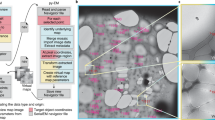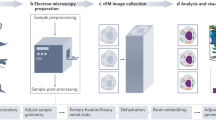Abstract
FREQUENTLY when examining autoradiograms of biological specimens there is a need for resolution such as can be obtained with the electron microscope. A technique for preparing autoradiograms for electron microscopy has been reported by Liquier-Milward1. The method described here has the advantage of being somewhat simpler in that nuclear emulsion is applied directly to the specimen grids, and the method is suitable for use with ultra-thin sections. Although only results obtained with yeasts and the alpha-emitter polonium-210 are described, other isotopes and biological specimens can be used.
This is a preview of subscription content, access via your institution
Access options
Subscribe to this journal
Receive 51 print issues and online access
$199.00 per year
only $3.90 per issue
Buy this article
- Purchase on Springer Link
- Instant access to full article PDF
Prices may be subject to local taxes which are calculated during checkout
Similar content being viewed by others
References
Liquier-Milward, J., Nature, 177, 619 (1956).
Chapman, G. B., and Hillier, J., J. Bact., 66, 362 (1953).
Agar, H. D., and Douglas, H. C., J. Bact., 70, 427 (1955).
Author information
Authors and Affiliations
Rights and permissions
About this article
Cite this article
O'BRIEN, R., GEORGE, L. Preparation of Autoradiograms for Electron Microscopy. Nature 183, 1461–1462 (1959). https://doi.org/10.1038/1831461a0
Issue Date:
DOI: https://doi.org/10.1038/1831461a0
This article is cited by
-
Probleme der elektronenmikroskopischen Autoradiographie
Die Naturwissenschaften (1966)
-
Durchführung und Anwendungsmöglichkeiten der elektronenmikroskopischen Autoradiographie
Zeitschrift für Die Gesamte Experimentelle Medizin (1965)
-
Melanogenesis: An Autoradiographic Study at the Ultrastructural Level**From the Division of Dermatology, Department of Pathology and Department of Anatomy University of Minnesota Medical School, Minneapolis, Minnesota.
Journal of Investigative Dermatology (1964)
-
Use of Electron Autoradiography for investigating Viral Infection in Tissue Culture
Nature (1964)
-
Localization of Tritiated ‘Digoxin’ in the Myocardial Cells of Frogs and Dogs by Autoradiography Combined with Electron Microscopy
Nature (1963)
Comments
By submitting a comment you agree to abide by our Terms and Community Guidelines. If you find something abusive or that does not comply with our terms or guidelines please flag it as inappropriate.



